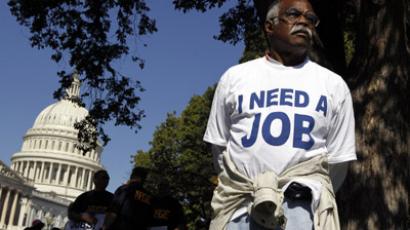Calling it quits: Labor force participation rate hits 34-year low in US

The unemployment rate dropped in the United States for the month of March, but only because the number of Americans who stopped looking for work hit a three-decade high.
When the US Labor Department released jobs statistics this week for March, the agency said the percentage of unemployed Americans dropped slightly, falling one-tenth of a point from the previous month to 7.6 percent. On the other hand, though, the labor force participation rate — the number that measures the proportion of Americans who either have a job or are actively looking — has hit a low that hasn’t been seen since the Carter administration.
While the proportion of Americans without jobs but actively seeking work has slumped to 7.6 percent, that statistic can be considered largely more optimistic than what is actually occurring. Yes, fewer Americans are without work in the eyes of the Labor Department, but that’s only because the bureau has a smaller number set to work with: 88,000 new people were added to company payrolls last month, but 290,000 fewer people were counted as unemployed because they stopped actively looking for work.
Additionally, the 88,000 new jobs isn’t exactly something to write home about: 140,000 new jobs were created in January, and February saw the addition of 260,000 names to company payrolls.
With more Americans simply giving up, however, the labor force participation rate fell to 63.3 percent, the lowest the statistic has been since 1979.
“Normally during an economic recovery, an expanding economy lures job seekers back into the labor market,” write Christopher S. Rugaber and Paul Wiseman for the Associated Press. “This time, many have stayed on the sidelines, and more have joined them.”
Heidi Golledge, the founder and CEO of Cyber Coders and CareerBliss, says to the Huffington Post that she thinks this is happening because Americans are becoming increasingly unqualified for the jobs that are in demand. “The answer is that employers can't find the right workers,” she says. “Too many unemployed American workers lack the relevant skills needed to fill the millions of jobs available. Unfortunately, this gap between people wanting work and employers wanting workers is poised to grow as some 1.8 college students prepare to graduate in 2013 and enter the job market.”
“We are on a dangerous and growing path towards higher unemployment unless we start training workers for the growing sectors -- not the dying ones,” she adds.
Other economists blame the dismal jobs labor numbers on the growing number of Americans in late-middle-age who are approaching retirement and walking away from the workforce. “The vast generation of baby boomers has begun to retire,” write Rugaber and Wiseman, and meanwhile dire times in the manufacturing sector have meant fewer jobs for the able-bodied men who would otherwise be given factory jobs that require less training.
The negative numbers come across the board, however, with even Americans ages 25-to-54, “prime age,” according to the Economic Policy Institute’s Heidi Shierholz, giving up on the job hunt. While labor force participation as a whole has dropped to 63.3 percent, Shierholz says the proportion of “prime age” workers in the market has dropped to 81.1 percent — the lowest rate since 1984.
"It's the lack of job opportunities, the lack of demand for workers, that is keeping these workers from working or seeking work, not other factors," she adds to CNN.














